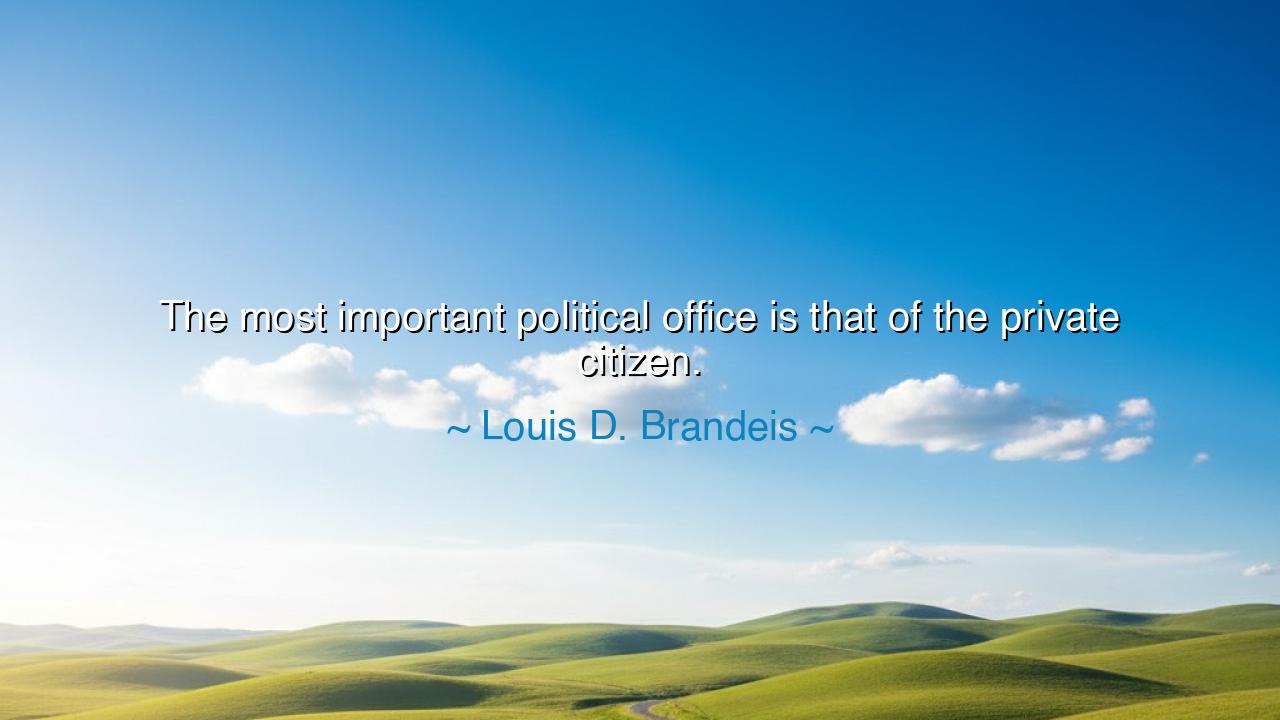
The most important political office is that of the private






The words of Louis D. Brandeis — “The most important political office is that of the private citizen.” — resound with the gravity of a man who understood both the majesty and fragility of democracy. Brandeis, a Supreme Court Justice and fierce defender of liberty, spoke not to flatter the people, but to remind them of their sacred duty. For he knew that no ruler, no president, no judge could sustain a republic if its citizens slept in idleness.
The meaning is clear and eternal. The political office of the private citizen is not written in constitutions, nor sworn by oath, but it is greater than any title. It is the responsibility to think, to vote, to question, to guard the rights of all. Without vigilant citizens, laws decay into tyranny, and governments become masters rather than servants. Brandeis lifts the common man to his rightful throne, declaring that sovereignty belongs not to kings nor parties, but to the people themselves.
History bears shining testimony to this truth. In the early years of the United States, it was ordinary citizens, farmers and merchants, who demanded independence from Britain and shed blood for liberty. Centuries later, during the Civil Rights Movement, it was the private citizens — Rosa Parks refusing to yield her seat, students marching in Selma — whose courage forced the conscience of a nation to awaken. They held no official office, yet their actions shaped history more than laws written in marble halls.
Brandeis himself, as a jurist, often warned against the creeping power of unchecked government and unbridled corporations. He saw that only an engaged citizenry could resist corruption, for officials are ever tempted by power. The citizen must be the watchman, the critic, the guardian, lest the republic fall into decay. His words are both empowerment and warning: the fate of freedom rests not in leaders alone, but in the daily choices of ordinary souls.
Let this wisdom endure: never forget the dignity of the private citizen. For the republic is not sustained by the glory of presidents or the might of armies, but by the conscience of its people. Brandeis speaks across the ages, reminding us that the highest political office belongs to each of us, and its duties are eternal: to seek truth, to defend justice, and to preserve liberty for those yet unborn.






HDNgan 18 Bui Huynh Diem
I find this quote to be both empowering and humbling. It implies that individual actions, whether through advocacy, community involvement, or simply staying informed, can have a far-reaching impact. Does this shift the responsibility back to us as citizens to ensure we remain active in democracy, not just passive observers?
MGHuy Moc gia
Brandeis' perspective is a reminder of the power citizens have outside of formal politics. It’s easy to feel powerless when we focus on the decisions made by politicians, but how much can we achieve by simply using our voices in everyday life? What are some practical ways citizens can exercise their political office beyond voting or protests?
NHVo Tran Ngoc Huu
This quote challenges the typical hierarchy of politics, where we usually think of elected officials as the most important figures. Brandeis seems to be saying that it's the private citizen who can truly influence the course of society. Does this mean we should be more active in our civic duties, or is it enough to just vote and stay informed?
HHung
Louis D. Brandeis’ quote speaks to the idea that true power lies with the individual, not the politician. It suggests that the most significant change can come from the actions and voices of ordinary people. Do we often overlook the role of the private citizen in shaping politics? How can individuals leverage this ‘political office’ to bring about change?